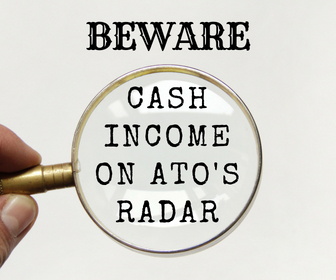Cash payment is preferred by most customers and businesses for small transactions to avoid card and electronic payment fees. However, some businesses overlook on the fact that they have to disclose their cash earnings. Cash is hard to trace when not banked in, so this attracts attention from the ATO. Some people of the cash economy deliberately want to avoid tax obligations and breach employment laws. Therefore, the ATO has come up with third-party data and risk analysis to track down undeclared income costs.
Who?
The ATO is now targeting small service sector businesses that receive cash payments. These include businesses such as:
• Cafes and restaurants,
• Butchers,
• Convenience store owners,
• Hair, beauty and nail salons,
• Carpentry and electrical services,
• Building trades,
• Road freight businesses,
• Waste skip operators, and
• Cleaners.
How to safeguard?
For employees:
Your employer may pay you in cash, rather than into your bank account. It is legal and more convenient but some businesses deliberately pay their employees by cash to avoid meeting tax and employee obligations.
If you are being paid cash, you:
• must declare the cash as income when you lodge your tax return.
• should receive a pay slip showing all your earnings and the amount of tax taken out.
• should receive a payment summary at the end of the year which shows your full annual earnings
and the amount of tax deducted.
• should check that your employer is making super contributions on your behalf.
• must declare tips on your tax return – regardless of how you receive them (tips from your
employer or directly from customers)
For businesses:
In order to protect your business from being targeted:
• Deposit all cash payments into bank accounts;
• Keep evidence to support your income, expenses and lifestyles;
• Ensure you can account for stock used for private purposes; and
• Analyse the performance of business in comparison to other similar businesses in the same
industry by using ATO small business benchmark tool.
If you need help with documenting your business income, expenses and stock, calculating whether your business is performing within the small business benchmarks or require more advice on how to keep your business out of the ATO firing line, contact or visit us today at Simpro Taxation Services.
How ATO tracks?
The ATO collects information from various sources including banks, employers, merchants and government departments and compares this information with your income tax return. At great lengths, the ATO may obtain information about your business from suppliers, to calculate your turnover should be. The ATO can find inconsistencies by matching the calculated turnover with your actual based on your income tax and GST reporting.
If the ATO identifies discrepancies, you may be examined by the ATO and formally audited. For example, there is inconsistency with cash received in your bank account or expenses and your income as declared in tax returns.
The ATO collects information of every business in Australia to create profiles of businesses based on their different characteristics. This is to benchmark and compare its income, costs profit margins and profitability.
For example, if most of your business income is from selling goods but the business also renders services. When the tax return is done, the business code chosen is for the service industry where most of your income does not come from. This will cause the ATO to compare your business with businesses of a completely different industry. This will then lead them to think your business has fallen outside the industry benchmarks. So, if your business’s figures falls outside the small business benchmark figures when compared to other businesses similar to yours in your area, the ATO will be interested to find out why.
You may be audited even if you have a good reason for falling outside the ATO benchmarks and haven’t done anything wrong. Hence, it is important to ensure your accountant checks that you are within the benchmarks for your industry and choose the correct industry code to avoid being audited or out of the ATO’s radar.
Why should I care?
If the ATO concludes that a taxpayer has undeclared income, he/she is generally liable for tax on the undeclared income plus interest charges and penalties. Penalties can include fines and, in the case of criminal prosecutions, imprisonment.
